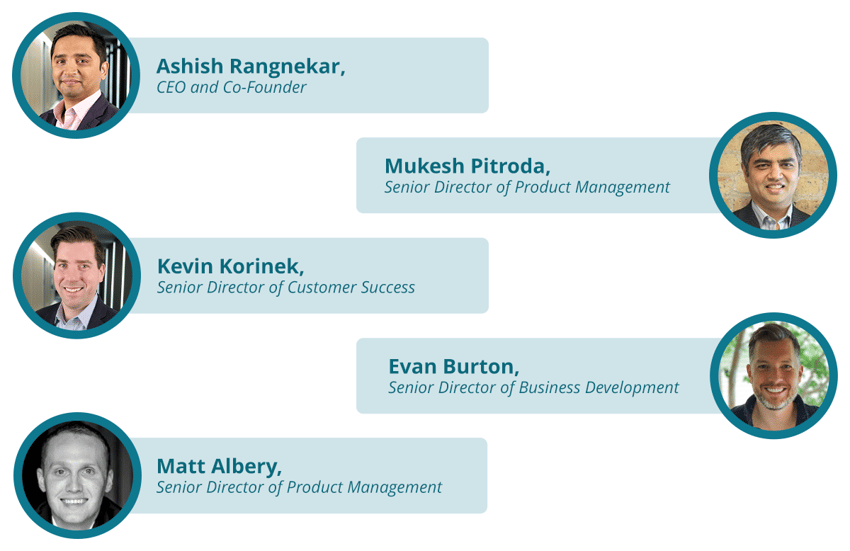Embracing the Future: 5 Key Professional eLearning Trends in 2024
As we enter the dynamic landscape of 2024, we reflect on the whirlwind of changes that shaped the learning industry. Last year witnessed remarkable advancements in Artificial Intelligence (AI), the rise of blended learning, and the adaptation to a fluctuating economy–making it a landmark year in eLearning and professional development.
Today, learning and credentialing organizations are not just adapting; they're leading the charge in an era brimming with potential. The future of professional education is not just promising but revolutionary, with the global eLearning market projected to surge to an unprecedented $1 trillion by 2032. Now more than ever, the industry must embrace emerging eLearning trends to craft engaging learning experiences, meet learners where they are, and help them achieve professional success
So, what’s on the horizon for the professional learning industry in 2024? What trends should you adopt to help your learners meet their goals and grow your certification and continuing education programs? In this blog, we’ll explore the pivotal eLearning trends that will shape the industry in the coming year. You’ll hear from BenchPrep’s own eLearning and tech experts on how these trends will impact professional learning for years to come.

Trend 1: Harnessing AI, AR, and VR for Innovative Learning Experiences
Artificial Intelligence (AI):
Artificial Intelligence (AI) is more than a buzzword—it's a potent force driving innovation in eLearning. AI's impact goes beyond automating tasks; it's about transforming the entire learning experience.
In 2024, we anticipate AI becoming more deeply integrated into content creation, personalizing learning journeys, and offering invaluable insights into learner progress.
Here is what our team has to say about AI:
"Let's acknowledge and remind ourselves that we’re in the very early stages of the AI life cycle right now. The technology is changing very fast. And given these dynamics, what we are trying to do is not jump to conclusions saying 'Hey let's use AI for this versus that'. The first question to ask is 'What problem are you trying to solve?'. In respect of how powerful the technology is, it needs to serve the right business goal. So when you think of AI, let’s start with a business goal. It can be revenue generation, building new products that just weren’t possible before, or getting products faster to market. There is no right or wrong answer here, it just all has to start with the goal. And once you align on the goal, then you can figure out how to leverage AI to solve it." - Ashish Rangnekar
“AI will have a huge impact on how companies create content, and how that content is used to educate learners. AI will enable more personalized assistance and learning to individuals, customizing content to their interests and areas of improvement.” – Mukesh Pitroda
“AI represents the next major technological evolutionary leap (Internet → iPhone → AI) and its use cases are seemingly endless, but the learning industry is largely focused on two main themes: Content Development and Learner Coaching. The ultimate question around these two uses is quality.” – Kevin Korinek
“I see an increase in the use of generative AI, specifically in item writing, education, and credentialing.” – Evan Burton
“Organizations strive to identify potential implications of AI advancements for the audience(s)s/profession(s) they serve, as well as how to employ it in their products and internal operations.” – Matt Albery
Augmented Reality/Virtual Reality (AR/VR):
The marriage of Augmented Reality (AR) and Virtual Reality (VR) with eLearning is set to create immersive and engaging educational experiences.
Mukesh Pitroda highlights the significance of this integration: “Organizations are increasingly investing in AR/VR technologies, particularly for skills training."
Imagine learners stepping into virtual environments, conducting experiments, or practicing real-world skills. AR and VR technologies are not just trends; they are the gateway to a new era of interactive and dynamic learning.
Trend 2: The Rise of Alternative Credentials
In 2024, the traditional academic path faces competition from the rise of alternative credentials. As the demand for targeted, skill-specific education grows, micro-credentials, badges, and other alternative forms of credentialing are gaining prominence.
Learners are seeking flexible, bite-sized learning experiences that provide tangible, real-world skills—a shift that is reshaping the credentialing landscape.
“There will be a slow shift away from one-time large learning models to more frequent microlearning models.”
– Mukesh Pitroda
“No two learners are the same. Essentially, different learners require different learning pathways. A single linear experience endeavors to meet the needs of a wide range of learners, but in today’s world of competing priorities, it’s not the most efficient means of knowledge gain.
As an industry, we’ve done a really good job of optimizing the content creation process for digital learning. Content is high-quality and more engaging than ever, but how do we effectively select components of multiple high-quality offerings to create the “perfect” experience for unique learning objectives.” – Kevin Korinek
Trend 3: Setting New Standards - The Evolution of eLearning Practices into Industry Benchmarks
The eLearning industry has matured significantly over the years, and what was once considered cutting-edge is now the standard practice. Concepts such as microlearning, social learning, virtual conferences, and blended learning have evolved from experimental ideas to integral components of effective learning strategies.
Organizations that wholeheartedly embrace these standard practices are not only keeping up with the latest trends but are also setting the benchmark for excellence in digital learning.
As the eLearning landscape continues to evolve, it is crucial for organizations to stay ahead of the curve, innovate, and continually strive for excellence in their learning strategies.
Interested in learning more about this trend? Check out this on-demand webinar hosted by Leading Learning, where industry experts Jeff Cobb and Celisa Steele dive deeper into their survey results!

Trend 4: B2B Growth in eLearning
Business-to-business (B2B) growth is a standout trend in 2024, and for good reason. As organizations recognize the untapped potential of selling directly to other businesses, they are finding new ways to expand their product reach and grow their learner base.
The shift from traditional training methods to digital, scalable eLearning solutions is no longer just a cost-effective choice; it has become a strategic investment in workforce development and performance improvement. By embracing B2B growth, organizations can not only enhance their own offerings but also provide valuable resources and solutions to other businesses.
B2B growth in the eLearning industry is a trend that organizations cannot afford to ignore in 2024.
"One area that is becoming more important for learning businesses is B2B. Traditionally, we have seen learning businesses have primarily gone B2C. That comes naturally to them. But we’ve seen in the last couple of years, that learning organizations like membership associations are beginning to partner with universities and even go directly to employers. B2B is becoming the biggest growth driver. We see higher ed is struggling with its business model, so they're looking for ways to bridge the gap. As we think about growth, organizations should look beyond B2C and look to explore some B2B channels as well." - Ashish Rangnekar
“Organizations seek to scale distribution of digital products, and increasingly view institutions of higher education and content marketplaces as a promising means of filling the top-of-the-funnel, in addition to employing more traditional B2B and reseller models, and global expansion.” – Matt Albery
Trend 5: Supporting the Lifelong Learning Journey
Last, but certainly not least, one of the most crucial trends of 2024 is the recognition and support of the lifelong learning journey. Organizations have come to understand the immense value in providing continuous support and guidance to learners throughout their entire educational and professional development journey. This shift in approach emphasizes the importance of building long-term relationships with learners, fostering loyalty, and creating a sense of belonging.
By offering ongoing support and resources, organizations can not only meet the evolving needs of their learners but also drive program growth and revenue. This commitment to lifelong learning involves a holistic approach that goes beyond traditional educational offerings. Organizations may explore new use cases, such as launching new products, offering different instructional models, or leveraging new distribution models.
“I see an expansion of life-long learning relationships between organizations and their members through micro-credentialing and CE.” – Evan Burton
Embrace These Trends and Transform Your Learning Program with an LMS
As 2024 unfolds, we're witnessing a profound transformation in the professional learning industry. This evolution is marked by the integration of advanced technologies, the rise of alternative credentials, the maturation of established learning practices, the growth in B2B eLearning, and the increasing emphasis on lifelong learning. This dynamic landscape presents both challenges and opportunities.
Adapting to these trends is no longer a mere option but a necessity for those committed to excelling in the realms of education and professional development. The success in this transformational journey hinges on leveraging learning technology that can adapt and evolve with your needs.
At BenchPrep, our LMS is crafted to serve as a strategic ally in this journey. Our platform is designed to empower you to embrace emerging trends effortlessly. Choose a learning solution that grows with your ambitions, providing the agility and innovation necessary to remain at the forefront of the eLearning evolution.






